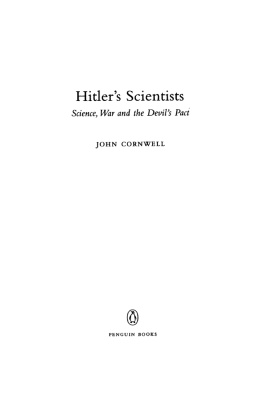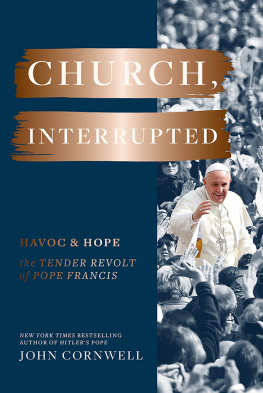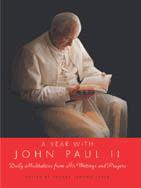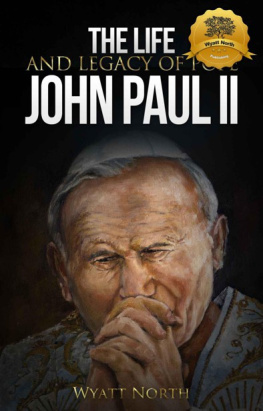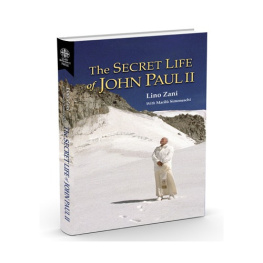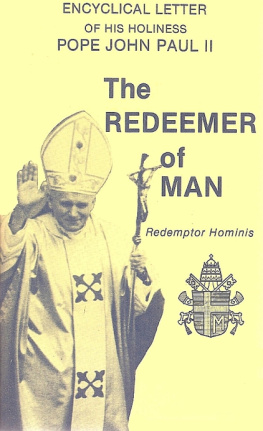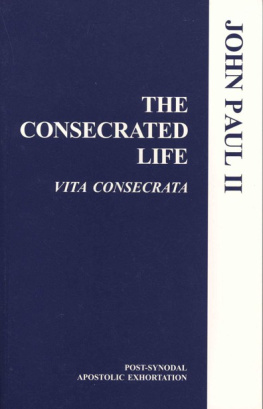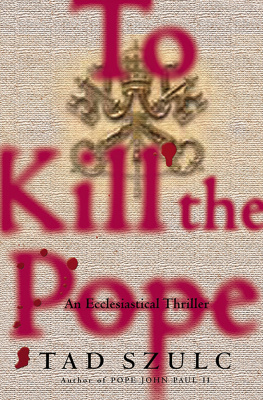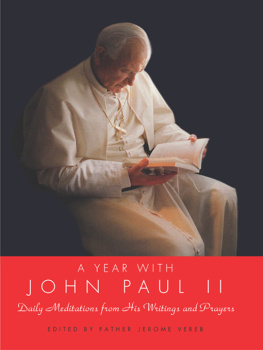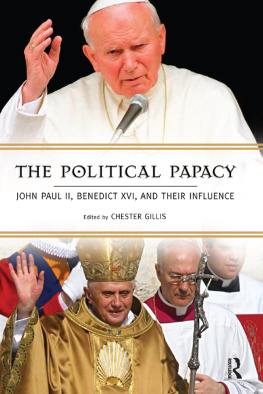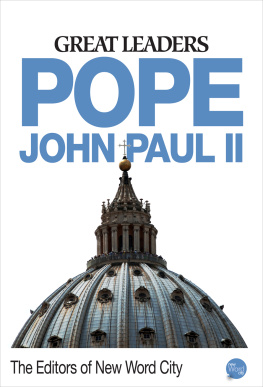
PENGUIN BOOKS
THE POPE IN WINTER
John Cornwell is an award-winning journalist and author. His Hitlers Pope: The Secret History of Pius XII was a world bestseller. He has written on scientific issues for a number of periodicals, including New Scientist and the Sunday Times Magazine . His book on the 1995 Prozac trial, Power to Harm: Mind, Murder and Drugs on Trial , was widely acclaimed, and he is the editor of a trilogy of science books: Natures Imagination, Consciousness and Human Identity and Explanations . He is Director of the Science and Human Dimension Project at Jesus College, Cambridge, and a member of the Department of History and Philosophy of Science at Cambridge University.
The Pope in Winter
The Dark Face of John Paul IIs Papacy
JOHN CORNWELL

PENGUIN BOOKS
PENGUIN BOOKS
Published by the Penguin Group
Penguin Books Ltd, 80 Strand, London WC2R 0RL , England
Penguin Group (USA) Inc., 375 Hudson Street, New York, New York 10014, USA
Penguin Group (Canada), 10 Alcorn Avenue, Toronto, Ontario, Canada M V B
(a division of Pearson Penguin Canada Inc.)
Penguin Ireland, 25 St Stephens Green, Dublin 2, Ireland
(a division of Penguin Books Ltd)
Penguin Group (Australia), 250 Camberwell Road,
Camberwell, Victoria 3124, Australia (a division of Pearson Australia Group Pty Ltd)
Penguin Books India Pvt Ltd, 11 Community Centre,
Panchsheel Park, New Delhi 110 017, India
Penguin Group (NZ), cnr Airborne and Rosedale Roads, Albany,
Auckland 1310, New Zealand (a division of Pearson New Zealand Ltd)
Penguin Books (South Africa) (Pty) Ltd, 24 Sturdee Avenue,
Rosebank 2196, South Africa
Penguin Books Ltd, Registered Offices: 80 Strand, London WC2R 0RL , England
www.penguin.com
First published by Viking 2004
Published in Penguin Books 2005
Copyright John Cornwell, 2004
All rights reserved.
The moral right of the author has been asserted
Except in the United States of America, this book is sold subject
to the condition that it shall not, by way of trade or otherwise, be lent,
re-sold, hired out, or otherwise circulated without the publishers
prior consent in any form of binding or cover other than that in
which it is published and without a similar condition including this
condition being imposed on the subsequent purchaser
EISBN: 9780141905440
For JGM and JS, with love and gratitude
Contents
List of Illustrations
( Viviane Riviere/SAOLA/eyevine ) ( Bettman/Corbis ) ( Viviane Riviere/SAOLA/eyevine ) ( Viviane Riviere/SAOLA/eyevine ) ( Adam Gatty-Kostyal/AP ) ( Viviane Riviere/SAOLA/eyevine ) ( Reuters ) ( Corbis Sygma ) ( Vittoriano Rastelli/Corbis ) ( Reuters ) ( Bettman/Corbis ) ( AP/Rainer Klostermeier ) ( Bettman/Corbis ) ( Corbis ) ( Erich Schlegel/Dallas Morning News/Corbis Sygma ) ( AP Photo/Massimo Sambucetti ) ( AP/Plinio Lepri ) ( AP/Osservatore Romano )
Prologue: John Paul the Great
Karol Wojtyla, Pope John Paul II, has shown himself to be a man of rare depth of soul, an evangelist of tireless energy who travelled to the ends of the earth to spread the Christian Gospel. Priest and prophet, he has acted to conserve the traditions of the Catholic Church, while urging transformation in preparation for a millennial springtime of the spirit.
He raised the consciousness of his Polish countrymen, exposing the sterility of Soviet totalitarian rule. He preached freedom as a characteristic of our humanity. But he warned of the danger in capitalist democracies of liberty that lacked moral culture. He presented to the world an original understanding of Christian humanism and saw marital sex as an icon of the Trinitarian God. He strove for Christian unity, reaching out to Eastern Orthodoxy and the Churches and Communions separated from Rome by the Reformation. And all the while he toiled, despite encroaching illness, pain and old age, to maintain the unity and continuity of the Catholic Faith. As Shakespeares Kent says of the passing of King Lear: The wonder is he hath endured so long / He but usurpd his life. His ardent supporters among the faithful seem justified in hailing him Karol the Great.
But there is a parallel, rather than an alternative, Catholic version, rarely expressed in public in deference to a taboo that forbids criticism of living and even dead popes. A widespread constituency of Catholics, men and women, clergy and bishops, throughout the world, are convinced that John Paul has drawn so tightly on the reins of universal authority that he has weakened and undermined the discretion, the authority, the integrity and the strength of the local, diocesan Church. They believe that, while appearing triumphant in the world at large, he is leaving his Church in a state of weakness and conflict.
This centralizing papal dynamic over more than a quarter of a century has had profound consequences, of which the complex scenario of the sexual abuse by priests is but one example. The systemic corruption of clerical sexual abuse has revealed a dimension of paralysis and vacillation on the part of local bishops and senior clergy who have attempted to conceal and deny it. Undermined by years of centralizing papal rule, there was a tendency for local church leaders to look over their shoulders to Rome, where initiative and authority was deemed to reside in all matters. And yet action was not forthcoming from the papal pinnacle. Indifference, and complacency, were found right up to John Paul himself, until world indignation left Rome no choice but to acknowledge the crisis.
His failure to recognize from the outset a complex set of crises within the priesthood, and to handle them appropriately, contrasts starkly with his harsh denunciations of those who failed to achieve the high standards of sexual morality he set for Catholic laity. John Paul advocated exclusion from the life of grace for those Catholics who had divorced and remarried (some 40 per cent of Catholic marriages end in divorce in Western countries), or who lived in unmarried partnerships or in homosexual relationships.
His hard line on all forms of contraception in any circumstances has alienated generations of the faithful. In Africa, while agencies were right to warn against encouraging promiscuity through free distribution of condoms to the young, he took an extreme stance. His insistence that condoms should not be used in any circumstances condemned untold numbers of Catholics at risk for HIV infection to almost certain death. He excluded women from any future hope of priestly ministry not only within his own pontificate but by attempting to legislate for his papal successors, for all time. He has shut his ears to pleas for married clergy, and rejected requests for laicization by priests who have married and started families refusing them the sacraments.
While making a show of encouraging inter-faith dialogue and urging ecumenism, he characterized other religions (that is, non-Christian religions) as defective, claiming that many Christian denominations, including the Anglican (Episcopalian) denominations, were not proper Churches, their priests and bishops not proper priests and bishops. Despite his deep longing to come to an accord with the Russian Orthodox Church, he established Roman Catholic dioceses in Russia in defiance of the concerns of the entire Eastern Church.
His debility in his latter days has exposed the long-term consequences of his autocratic papal rule. He has become a living sermon of patience and fortitude, appealing to the sympathies of the entire world; but the billion-strong Church has been run increasingly by his Polish secretary and a handful of ageing reactionary cardinals. We have had a papacy in which a pope utters virtual heresy, bishops and faithful are told they may not discuss women priesthood, a curial cardinal teaches that condoms kill, prelates guilty of having shielded paedophiles are honoured, and a US president exploits the papacy as an election campaign stop.
Next page

